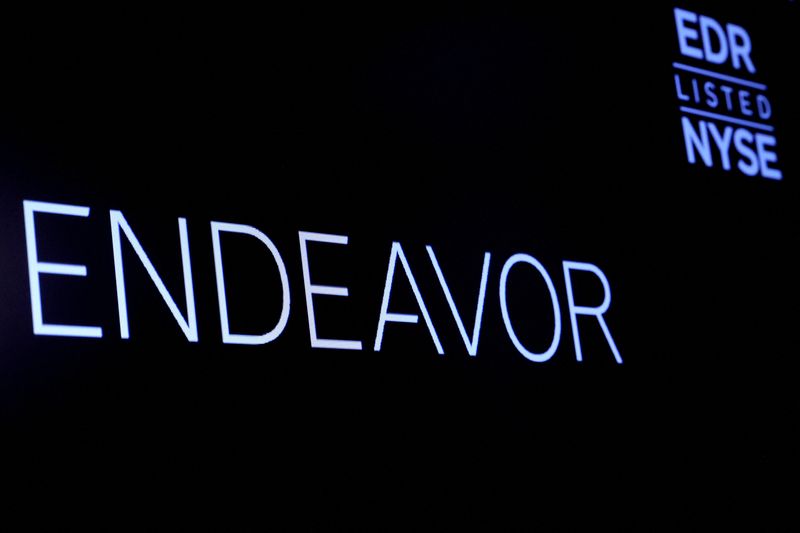By Anirban Sen and Tom Hals
(Reuters) - Endeavor Group's decision to deny minority shareholders the ability to veto a $13 billion deal to take the entertainment conglomerate private is the latest example of a company's controlling investors risking lawsuits to avoid paying a higher deal price.
At stake is a corporate governance safeguard that reassures minority investors they are getting a fair price and protects companies' stock market valuations from taking a hit on concerns a deal would undervalue them, corporate lawyers and investment bankers say.
Endeavor agreed last month to be taken private by a consortium of its investors, led by private equity firm Silver Lake, which holds 71% of the voting stock in the company. It inked the deal without agreeing to hold a vote where a majority of the investors not participating in the consortium would have to approve it.
Without such a "majority-of-the-minority-investors" threshold, a deal vote becomes a formality, since the shareholders that control the company are also the ones buying out the minority investors.
A special committee of independent board directors that negotiated the deal on behalf of Endeavor tried unsuccessfully to convince Silver Lake to sign off on a majority-of-minorities shareholder vote, people familiar with the matter told Reuters.
Nearly a dozen lawyers and bankers told Reuters there is a growing realization among the controlling investors of companies that the financial benefit of depriving minority shareholders of a deal veto outweighs the legal risks.
"(The shareholder vote) opens the door to an activist who can say, 'I know you're negotiating with the special committee, but now you're going to negotiate with me, and I'm going to squeeze a second bite'," said Phillip Mills, an M&A partner at law firm Davis Polk.
Endeavor did not respond to requests for comment on the decision not to stage a shareholder vote on the deal. Silver Lake declined to comment.
Endeavor, run by Hollywood power broker Ari Emanuel, is well-known for representing film and television talent. It has grown to become a sports and entertainment behemoth through more than 20 acquisitions.
At least three other U.S. companies were taken private by majority shareholders over the last two years without seeking approval by minority investors.
These include buyout firm Thomas H. Lee's $2.5 billion deal in February to take medical equipment management company Agiliti private, and grill maker Weber's controlling shareholders led by BDT Capital acquiring it last year for $3.7 billion.
If this trend of controlled companies denying minority shareholder vetoes to take-private deals continues, it could weigh on these companies' valuations as investors bet they would be sold at a lower premium, investment bankers and analysts say.
HIGHER COST OF SETTLEMENT
Swedish bank Handelsbanken, which is suing Endeavor for selling itself too cheap, cited the omission of a shareholder vote in its lawsuit as evidence of the company trying to shortchange investors.
Endeavor said in a regulatory filing last week it has also received multiple shareholder requests seeking internal records of the deliberations on the deal.
The lawyers who are advising companies against giving minority shareholders a deal vote argue the worst that can happen, based on court precedent in Delaware where most companies are incorporated, is that the controlling shareholders may be ordered in court to pay 5% to 10% over the deal price, possibly years after the transaction has closed.
Skipping the vote, on the other hand, prevents hedge funds and other activist shareholders from making deal price demands and allows a transaction to close more quickly, the lawyers say.
"It is not unusual for controlling shareholders to take on this burden rather than the execution risk of a special minority shareholder approval," said Ethan Klingsberg, co-head of U.S. corporate and M&A at law firm Freshfields Bruckhaus Deringer.
Freshfields advised Endeavor chairman Patrick Whitesell on the deal, but Klingsberg said he was not involved in it and was not commenting specifically on the Endeavor transaction.
To be sure, some controlled companies still give a veto to minority shareholders on deals involving insiders to minimize litigation risk. Website designing platform Squarespace said on Monday it would hold a vote for its minority shareholders on its $6.9 billion sale to private equity firm Permira and its controlling investors, including CEO Anthony Casalena and investment firms General Atlantic and Accel.
Silver Lake has experience with investors trying to squeeze it for more money on a deal. It opted for a vote for minority shareholders when it inked a $24.4 billion deal in 2013 to take Michael Dell (NYSE:DELL)'s eponymous computer maker private.

This resulted in the private equity firm offering a small price sweetener, some $350 million, to complete the deal, after Carl Icahn and other activist investors agitated for more money.
"Having a vote may be helpful from a business judgment rule perspective, but may inject real unpredictability into the transaction itself. Once a transaction is announced, you have merger arbs and other parties moving into the stock, so the voters at the time of the special meeting are not necessarily long-term holders of your stock," said Iliana Ongun, an M&A partner at law firm Milbank.